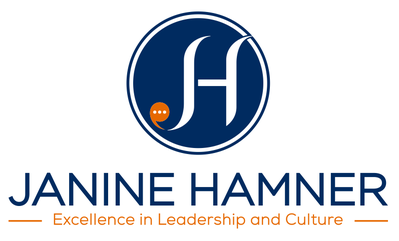
Listening is a skill that is often underrated. In our fast-paced, constantly-connected world, it can be difficult to slow down and listen to what someone is saying. The ability to listen deeply and attentively is a rare and valuable commodity. When we listen deeply, we create a space where the other person feels seen, heard, and valued. Today, Meredith Bell joins Janine Hamner Holman for a conversation about the fine art of listening. Meredith is an expert in leader and team communications. She is the co-founder and President of Grow Strong Leaders, a global software company providing assessment and development tools for the workplace with award-winning software and books that guide leaders and team members to shift from KNOWING to DOING. Join Meredith as she talks about how listening can lead to good communication, appreciation, and recognition of someone else’s value.
GUEST: Meredith Bell | LinkedIn | Visit her Website: Grow Strong Leaders
HOST: Janine Hamner Holman | [email protected] | LinkedIn, Facebook, Instagram, and Twitter |
—
Listen to the podcast here
The Fine Art of Listening with Meredith Bell
What am I paying attention to? I don’t want to call it a commodity because it’s certainly not something that we can go and trade in the commodity market but is it important for how things work? I had a coach often talked about workability. Is what you are doing creating workability or is it getting in the way of workability? Is it inhibiting workability? Is it making it harder for things to go well? Appreciation is one of those things.
I’m going to tell a little story about my husband. My husband had hip replacement surgery on his birthday. Talk about a not-happy birthday. His birthday is not a big deal for him so he kept saying, “Forget about it. Don’t make anything out of it,” so I didn’t. I made nothing out of it.
I was caretaking for him, going, fetching, and doing all the things for one’s significant other that we do when they go through major surgery. I did nothing for his birthday. He then decided that it didn’t feel very good and that he would love it if I gave him a card. I went to the store and got two cards. I said, “When would you like your cards?” He said, “Whenever.” He had a timeframe in mind but I took him at his word.
A couple of months later, I gave him his birthday cards and presents that I had bought before he said, “Don’t do anything,” and the first thing that he said to me was, “It is ten and a half months late. Thank you.” I paused and said, “I know that you are teasing me. It would be helpful if you could flip those two things. First the thank you then the teasing.” Even though it was a couple of months late and I know his birthday isn’t something he cares about, I had 7 or 8 presents for him plus two cards displayed festively.
Even though the purpose of giving gifts is to appreciate the other person, it’s a commodity that goes both ways. I wanted the appreciation for having done it. Those of us for whom appreciation is important, like words of acknowledgment of, “I see you. I see what you are doing. I appreciate what you are doing for me,” it makes a big difference. I hadn’t realized it was going to make a difference that I was giving him presents a couple of months late but it did. This experience made me think about how we communicate with each other.
Today’s guest knows a lot about effective communication. Meredith Bell is the Cofounder and President of Grow Strong Leaders, which is a global software company that provides assessments and development tools for the workplace with award-winning software and books that guide leaders and team members to make the shift from knowing to doing. The result is permanent improvements in the way that people interact with each other at work. She’s also the host of the Grow Strong Leaders Podcast. Welcome, Meredith.
Thank you, Janine. I loved your story. I’m looking forward to our conversation.
What people aren't paying attention to a lot of times is reading another person beyond the words they say. Share on XI’m looking forward to our conversation as well. I don’t want to make anybody wrong in this story but if you are going to make somebody wrong in the story, I’m the one who gets to be made wrong. I was a couple of months late on his birthday presents. By the time I pulled it all together, I wanted appreciation. I wanted that thank you. I know that it was a couple of months late because he was recovering from hip surgery and then had carpal tunnel surgery. He had two surgeries in three weeks, so it’s been a long period of fetching and helping him.
I wanted a little bit of an, “Atta girl.” It’s so interesting to me when we want that and don’t get it, and all the mischief that can happen. My husband and I have been together for almost a decade so I’m able to say, “I would love it if you could flip that. That would help me.”
What is something that you have noticed that people either are intentionally or unintentionally not paying attention to, and what do you think the cost is of that inattention?
I love that question because it could go in a number of different directions but there is a key related to the story that you told. People aren’t paying attention to what is beyond the words that are spoken. Your husband said, “It is no big deal. Don’t worry about it.” Yet beneath that, he was saying, “It really is important to me.”
We are usually busy and focused on our own stuff so we take at face value what people say instead of pausing. We are not paying attention enough to ask the question, “What might be going on with this person? What might they need? What might they want?” When we fail to do that, we can run into mischief. The cost of not paying attention always has to do with relationships because our behavior impacts someone else.
Kudos to you for addressing with him what you would have appreciated him saying to you first. Most people’s level of awareness isn’t as evolved as yours. There are often hurt feelings, disappointment, and people withdrawing instead of stating their needs and what they would like instead of what the person said or did. That’s what I’m paying more attention to.
I’m looking for ways to be more open to noticing signals from others and then asking to check and go deeper if the situation calls for it so that I don’t take at a superficial level what they are saying. It’s like asking your teenager, “How are you doing?” “I’m fine.” We know by the way they say that word that something is off. Another example is when I call a relative and I can tell by the way they say hello how they are. I pay attention to that and then ask before launching into whatever conversation I might have called them about. That’s a key thing.
I love what you are distinguishing here because we all have a hallucination about other people. At some level, we all expect other people to be able to read our minds a little bit. My husband said to me, “I’m going to get the transponder.” We have a transponder device for toll roads and we share it between our cars. That may not be what we are supposed to do but neither one of us is on a toll road often.

Art Of Listening: One of the key things and fundamental skills in communicating is listening.
He was going someplace where he needed the transponder so he got it out of my car. I woke up the next day, which was a Saturday, and he wasn’t there. An hour and a half went by and he was still not there. I called him and he didn’t answer. I wasn’t particularly worried but thought, “Where the heck is my husband on a Saturday morning? This is not a time when he’s up and out of the house.”
He came home and I said, “Where were you?” He said, “Don’t you remember? I had that thing.” I said, “You mentioned that a week or over a week ago and I had completely forgotten.” He said, “I reminded you yesterday.” I said, “You did? How did you remind me?” He said, “I told you I was getting the transponder.” I replied, “That was not enough of a reminder.”
We think that we are giving clues or signals to the people in our lives who are around a lot, whether it’s at home, at work, friends or family, about what they should do, what we expect, or what’s going to be happening. Often, the other person is not picking up what we are putting down. If we don’t check in about it, then we may or may not be complete in our communication about things. I know that this area of communication is one in which you are a true expert. What can you share with us about how we can ensure that our communication, whether it’s our appreciation communication or another form of communication, is being received in the way that we are intending?
When we are talking about sending a message to someone, it’s our responsibility to check in and say, “Could you summarize in your own words what you understood?” If you are trying to convey something important, whether it’s instructions or something else that could have a consequence if they haven’t heard you, then ask them in a respectful way, “Can you tell me what I just said?” That’s not what I’m talking about. It’s the idea of “What are the key takeaways you have from what I shared with you? It’s important for me that I was clear with you.” I’m taking responsibility for what I’m saying to make sure I’m being clear, not as a test of their memory. That’s a key thing.
A fundamental skill in communicating is listening. In our book Connect with Your Team, that is the number one skill. It’s the longest chapter because it’s fundamental to all the others that we talk about there. Most people think “I’m a pretty good listener,” but the fact is we miss a lot. It goes back to what I was saying about paying attention to someone’s tone of voice, and, if it’s in person, how they look or how they are standing. All of these are clues as to what the real message is.
You spoke about expecting someone to read our mind. We think that we can get their message without checking it. It’s important for us to use those few minutes after someone has shared something with us to make sure we’ve heard them. We don’t have to say, “What I hear you saying is (fill in the blank).” Say it in a way that sounds natural to you. “It sounds like you are frustrated because of x.” You are then capturing the emotion you are hearing and tying it to what they were saying. You are giving them a chance to respond to see if what you summarized is accurate.
We are often running, offering up a solution about something someone says without checking first and saying, “Is this what you really meant?” This gets us into so much trouble. I’ve done that many times myself. We all have our battle scars from making assumptions about what someone means. Part of it goes back to our egos getting in the way, that need to be right, or to defend our position or ourselves.
The cost of not paying attention always has to do with relationships because our behavior impacts someone else. Share on XA really good communication is being willing to be open, learn or hear another perspective whether I agree with it or not. It’s a way for me to understand where this person is coming from. That’s a key to forming strong connections with others and solid relationships. Building that trust is having that person feel heard, respected, and understood.
I love everything that you’ve said. I especially want to pull on the thread, “It’s okay if you say something and I have a different opinion about that, or I have a different lived experience around that, or that’s not my experience with that person, or that thing.”
We look through lenses but we listen through lenses too. There is an opportunity to listen through a different lens than the one we usually listen through which is “What do I think about what they are saying? Do I agree or do I not agree?”
I spent some time around a toddler who’s almost two. It’s such a fun age because, at that age, they are so curious about everything. We, humans, are naturally curious beings. As we age, we lose some of that natural curiosity about other people like, “That’s super interesting that you did that thing. Why did you do it that way? That’s not how I would have done it.”
Rather than stopping there, “Why did you do it that way? Maybe that’s not how I would have done it,” we go into this whole explanation in our brains because humans are also “meaning making machines”. We make meaning out of everything. It’s how our brains organize information. We think, “You did that thing that way which means you don’t respect me. You don’t like me. You think you are better than me. You think I’m an idiot.”
Whatever the things are, it is usually the negative things. Again, our brains are wired to come up with explanations for why someone did that thing that way as opposed to saying, “That’s interesting. Tell me about why you did it that way.” We tend to imagine some mischief rather than listening to learn or listening to what’s important to the speaker.
A small but powerful shift would be to change our thinking to, “What are her priorities? How does she see the world differently than I do?” If we can get back, even a little bit, to being curious about people, things, ideas, and even our own ideas, the world would be in a different place.
As I was listening to you, I was thinking about how we tend to jump to conclusions and judge someone, especially if we have had some friction with that person. It’s much easier to assume the worst because it has become our reflexive action. We are used to having conflict or some friction with this person whether we’ve disagreed, they have constantly challenged us, or whatever degree of dissonance there has been. Making a shift leads to appreciation that otherwise may not be present.
One of the most important lessons I ever learned about appreciation was from a podcast I heard several years ago. It was an early podcast with Dan Sullivan of Strategic Coach. He was talking about two definitions of appreciation that I internalized because they resonated so much with me. If your readers will imagine this, the next time they are getting ready to have a conversation, either at work or at home, with someone with whom they’ve had friction in the past, this could help the relationship.

Art Of Listening: Every human being needs to be understood and appreciated.
We are looking at two different definitions of appreciation. One is when we think of things appreciating like real estate or a stock we’ve invested in. We think more often of things appreciating or increasing in value. We don’t often apply that to people. If we did it, we would have two positive things happen. Let’s say I’m getting ready to have a conversation with you, and you and I have had differences in the past. If I take a few minutes before our conversation to either mentally or physically make a list of the things about Janine that I value and how she has contributed value to my life or work. I am making my mind think about the positives, not about the last time we had a rift. It’s the idea of increasing the value of the person in our own mind before we ever interact with them.
The second definition has a military context. A lot of times, a scout is sent out in advance of the troops to check things out. What they are doing is getting a full understanding or an appreciation of what the enemy was doing. It’s this idea of understanding the situation. When you think about bringing those two aspects of appreciation towards your attitude about a specific individual, it’s amazing.
I’ve done this with my husband, business partners, and other people. There was an individual at one time who annoyed me. We had opposite personalities. I took the time in advance of a conversation to go through this process and write out what this person brings to our relationship that I valued. When I met with the person in real-time, I brought an attitude of appreciating them, and they felt it.
You don’t have to say, “I have been listing all these things I appreciate about you.” The purpose of it isn’t to provide them with that list. It is to set our own minds with the right attitude in our interaction with them, and because of that, we can be more loving in our approach to them. Honestly, people feel that. When you come to them with a spirit of openness and you enjoy them, you are smiling, more relaxed, and not tense or worried about what’s going to be come out of their mouths, it is a whole different feeling. They pick up on it. The impact of doing that is that their perception of their own value goes up in their own mind. What a gift that is that we can give to another human being. That, to me, is deep appreciation when we help others recognize and feel their own value, so they increase their value in their own mind.
I love this idea. I’d never heard this before. I’m going to work on imprinting this in my brain as well. Years ago, I became interested in neuroscience, how our brains work, and why we do the things that we do. We’ve all heard that a large percentage of communication is non-verbal. It’s in our faces, eye contact, and body language. Some of it is in our brain. It’s in our intention. It’s in the energy that we are bringing to the conversation.
When we make that list of all the things that we appreciate about the other person, we are priming the pump. We are energetically getting ourselves ready for a good conversation. This reminds me of one of the most challenging bosses I ever had. She had a tendency to move people into the sun so that they were the shining star and they could do nothing wrong or into the outhouse where they could do nothing. It was a big fall from grace. It was difficult to be on that emotional rollercoaster.
Good communication is being willing to be open, to learn, and to hear another perspective. Share on XBeing in the sun was a public affair. Being in the outhouse was also a public affair. There was public shaming. It was not a good scene. It’s in the realm of what we refer to as toxic. I knew some things about her life and her family of origin. I knew her husband and kids. There were a couple of times when, instead of bringing my fear of “Which version of her am I going to get now? Am I going to be in the sunshine or the doghouse?” to the conversation, I brought appreciation. I remember how much she lit up. I’m not sure it impacted me at the moment in the same way that it impacts me in my memory of it.
She was not a happy person. There were a lot of challenges and conflicts in her life. I can picture it. I know exactly where we were, what we were doing, and what I said. Once, it was verbal. Once, it was the world’s longest text message when we were in a meeting. I’m not sure what moved me to create all of that appreciation for her because she was my nemesis and my boss.
The difference that it made in her, if only for a moment, created something for me as well. I was able to give that to her, and it made me feel good. When we think about doing things that feel like they are going to be hard or take a lot of work, there’s almost always a positive feedback loop in there that generates some juice, positive energy, or juju that comes back to us that is part of the payoff.
That’s such an important story for multiple reasons. We don’t know what kind of path somebody else has walked. When we’ve had past conflicts with someone, it may be that they were triggering in us something that we weren’t aware of, or that we hadn’t dealt with. Also, we can’t underestimate the positive impact our attitude or approach to someone else can have on them. It could be just for a moment or it could be for a lifetime. We never know what impact our words and actions could have on someone else.
Another aspect of what you said that is important is that we can never assume that, because someone has reached a certain level or position in a company or a certain degree of wealth, they don’t need appreciation. I will give you a great example. Many years ago, I was a member of an organization for business owners and entrepreneurs called Glazer-Kennedy Inner Circle. Bill Glazer was the president. I went to a number of their meetings. I made a point of looking for things that I was enjoying at the conference, and then I would go up to him and say, “I loved that last speaker. I needed to hear what they said.”
This is a guy that was a multimillionaire many times over. He responded, “You are so positive. Can I get you to call me every day and say nice things to me?” That’s not the end of the story because, after that particular conference, I found the perfect thank you card that I sent to him and his team. On that card, I itemized all the things I had appreciated about that conference. Do you know that it was in the next issue of the newsletter? Yes, my card was a full page of the newsletter for all the members.
I remember opening up my newsletter and seeing my card there. I got to thinking. It’s an example of people valuing being appreciated. I still have cards that I got from decades ago when I was teaching elementary school. It was from the parents who wrote to express their appreciation to me for what impact I’ve had on their children. I have long forgotten what gifts I received for Christmas or the end of the year but those cards mean a lot because they came from the heart.

Art Of Listening: The meaningful, positive recognition of what somebody has done is one of the most important aspects of leadership, parenting, and relationships.
Sometimes, we allow ourselves to conclude, “That person doesn’t need to hear it from me. It will go to their head or they will get a big ego.” All of those assumptions are inaccurate. Every human being has a need to be understood and appreciated. The more we can look for opportunities to do that, we also feed ourselves. There is an impact on us and how we feel about that person but also about ourselves in general because we have been generous with another person. We have given as opposed to focused on what’s wrong.
It’s easy to criticize and tear down. Your opening example about your husband was perfect. “It took two months, and thank you.” You spoke it so beautifully. “What would have felt better was hearing the thank you first.” If you feel that way, it’s likely that others feel that same way. What can we do to acknowledge the good that others do? The more specific we can be, the better because then it doesn’t feel like some generalized “atta boy” statement. It’s heartfelt and people sense that.
This is part of what I do professionally, and part of what I also do professionally is I work inside organizations to make things better. One of the things that I work with managers, directors, and leaders on is appreciation and not appreciation that’s generalized. People do not get as much from “Thanks so much for doing a great job.” They get more from “Thank you so much for this specific thing that you did,” in addition to how that thing that you did made something better. It could be how that made my day better, made me smile, or made it so that I didn’t have to worry about getting this thing in on time.
Whatever that contributed to me, to the project, or the organization, that’s when you want to call something out. The more we can practice that, the more that we can practice getting clear about what it is that we are appreciating and what was the value that it provided. The more that our appreciation is going to land with the people who we are appreciating, the more it is going to matter.
Appreciation matters to the younger generations in the workforce now, the Millenials and the Gen Zs. If you are not aware of this yet, in 2025, the Millennials and the Gen Zs will be 75% of the working population. The things that matter to them need to matter to all of us because this is the future of work. This kind of appreciation is not “Thanks for doing a good job.” It’s not the old, “I give them a paycheck, and that’s plenty of appreciation.” It’s the, “I appreciate this thing that you did, maybe even the way that you did it or how you got it done.” Whatever the particular qualities of it are, how they got it done, and what it contributed to you, the team or the organization, that’s when appreciation lands. That’s when it’s a commodity that can move things forward. It’s one of the key things that is going to keep people around in your organization.
We are in the midst of the Great Reshuffling or the Great Resignation, whatever you want to call it. The quest for top talent is tight. It is easier to keep the people that you have than to recruit new people. This commodity of appreciation is the biggest thing. It’s not money, benefits or sleeping pods. It is this idea of appreciating people for what they are doing day in and day out. Sometimes, it’s the way that you showed up in that meeting. The energy that you brought was so important to have a great outcome. That is what’s going to keep people around and motivated.
One gift we can give to another human being is deep appreciation when we help others recognize and feel their value. Share on XI love that you brought up both things: this is who I’m being in the moment, and this is what I am acknowledging is powerful in someone else. A lot of times, our strengths are not obvious to us because that’s who we are and what we do but for others, it’s like magic. They might think, “That was awesome.” For someone to point out to you the way you showed up and the energy you brought reminds them of their best selves and what’s valued. They might be motivated to give more of it when they see that it has been noticed. I love that example that you gave.
To me, the takeaway is, “What am I paying attention to? Am I even noticing how people show up to a conversation or a meeting? Am I noticing the good things people are doing?” Kids might get criticized way more than they get praised, and then this carries over to the workplace. People get criticized way more than they get praised. We are trained to focus on what we did wrong like when we get the red Xs on our papers in school, things get marked up, and we see all the things we did wrong. Instead, if we can re-train our brains to notice the positives, then that’s what we will start seeing more of. It takes a lot of practice. We don’t do it automatically.
Giving yourself credit for when you notice and implement it reminds you of what you want to emphasize going forward. I am not suggesting that we throw out all the things that we need to bring up to someone if they’ve done something wrong. I am saying that balance is important. If people feel like they are constantly being paraded, picked on or criticized, that’s going to cause them to say, “I’m out of here.” The meaningful, positive recognition of what somebody has done is one of the most important aspects of leadership in parenting and relationships.
I want to add one other thing. Sometimes, we recognize what someone has done and withhold that positive feedback because of our own egos. We are thinking that if we give this away, somehow, it takes something away from us. We think, “I don’t want it to go to their head.” All of that is nonsense. The reality is if we notice and see something, let’s give that generously to someone else. It will come back to us in terms of how we feel about ourselves and how they feel about us, and our relationship with them.
It will usually come back tenfold, magnified. I love that idea. That’s a perfect place for us to conclude this conversation. Adam Grant wrote a wonderful book called Give and Take about people who’s perspective and orientation is about giving rather than getting, receiving, and taking. When our attitude is about giving and contributing, then over the long-term, we make out much better in the world.
Let’s all practice a little today, tomorrow, and for the rest of our lives, giving and being curiosity. What might the world be like if we could have those perspectives as our new way of being?
Meredith, thank you so much for being with us and for sharing your wisdom, insights, humor, and perspectives. I so appreciate it.
Thank you, Janine. I appreciate you, your wonderful show, and the opportunity to share this important topic with your audience.
You are more than welcome. It has truly been my honor. This has been The Cost of Not Paying Attention. Remember, great leaders make great teams. Until next time.
Important Links
- Grow Strong Leaders
- Grow Strong Leaders Podcast
- Strategic Coach
- Connect with Your Team
- Give and Take
- https://GrowStrongLeaders.com/free/
- https://www.LinkedIn.com/in/meredithmbell
- https://Twitter.com/meredithmbell
- https://www.Facebook.com/meredithmbell
About Meredith Bell
 Meredith Bell is co-founder and President of Grow Strong Leaders, a global software company providing assessment and development tools for the workplace. Their award-winning software and books guide leaders and team members to make the shift from KNOWING to DOING. The result is permanent improvements in the way people interact with each other at work.
Meredith Bell is co-founder and President of Grow Strong Leaders, a global software company providing assessment and development tools for the workplace. Their award-winning software and books guide leaders and team members to make the shift from KNOWING to DOING. The result is permanent improvements in the way people interact with each other at work.
Meredith is an expert in leader and team communications, the author of three books, and the host of the Grow Strong Leaders Podcast. She has worked with thousands of business leaders, entrepreneurs, and Human Resources professionals to successfully implement her company’s products and books. Meredith co-authored her latest books, Connect with Your Team: Mastering the Top 10 Communication Skills, and Peer Coaching Made Simple, with her business partner, Dr. Dennis Coates. In them, Meredith and Denny provide how-to guides for improving communication at work and serving as a peer coach to others.





